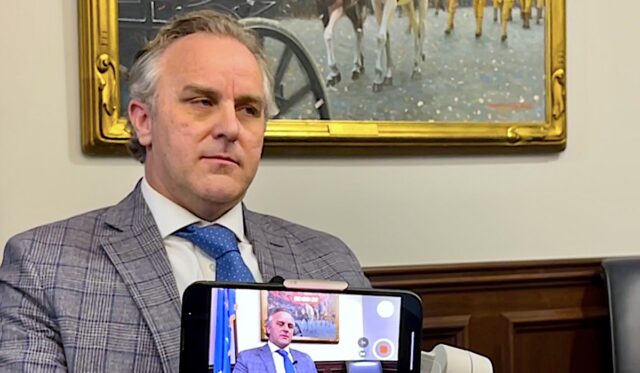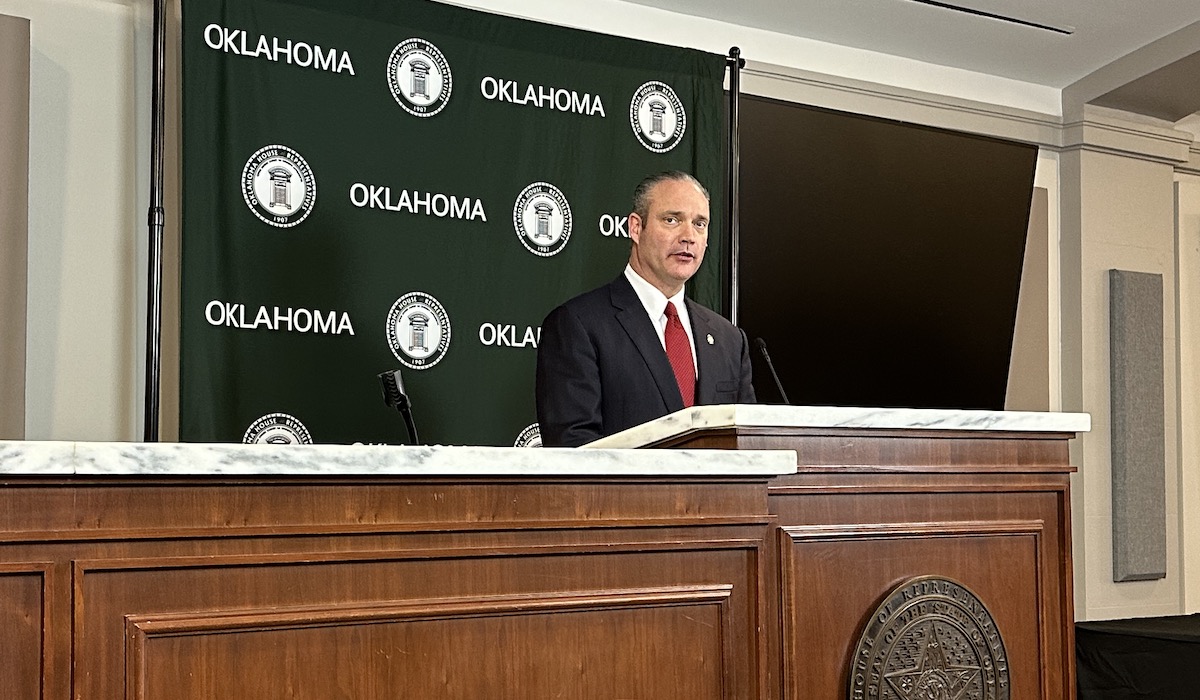

Senate President Pro Tempore Greg Treat took umbrage with his House counterpart’s claims about an education reform package this afternoon, employing sarcasm with media and calling Speaker Charles McCall’s statements “asinine.”
“The Senate has a role to play,” said Treat (R-OKC). “These members are duly elected, and we will play our role.”
Two hours earlier, McCall (R-Atoka) had held his own press conference to promote a pair of House bills sent to the Senate that propose $500 million of new education appropriations and the creation of new refundable tax credits for families who homeschool their children or send them to private schools.
McCall said the Senate should not amend the measures unless the upper chamber wants to kill the proposals.
“We expect those to be heard as is,” McCall said in a press conference today.”We are open to the Senate’s ideas for education. If they have some priorities, the House is certainly interested in anything that benefits education in the state of Oklahoma. But those would need to be advanced in Senate bills (…). If the Senate actions are to amend those bills — we made it clear to them — they are voting to kill the legislation.”
Metaphorically, Treat rolled his eyes in response.
“That’s asinine. That’s not the way this process works. We all know that. He knows that,” Treat said. “Last year, he made a bold statement at the beginning of session that he would not hear school choice. He’s changed his mind on that, and I’m glad.”
Treat eventually said, “I love Charles McCall,” but not before making at least six snarky digs at the man he has jousted with on policy and budgets for the past four sessions, including:
- Noting that McCall rarely holds media availabilities;
- Saying that Gov. Kevin Stitt has talked more about education than McCall since the House advanced the bills;
- Calling McCall’s claim that they had not discussed the topic “asinine” as well;
- Saying senators have had three weeks to review the bills, “which is about three weeks longer than his members had to read it;”
- Saying McCall’s suggestion of “trailer” bills to modify his proposal is “really nice;”
- Noting that the House has advanced more than $1.6 billion of ideas so far.
“They seem to send us the whole buffet and it’s up to us to choose, but apparently we can’t amend it at all,” Treat said. “I don’t react well to that. If the speaker’s goal is to kill school choice, he’s doing a great job by saying if we amend it at all — it’s setting the trap to blame me for school choice dying.”
Asked whether the Senate and House were already butting heads before the middle of March, Stitt said, “I hope not.”
“Hopefully cooler heads will prevail,” Stitt said. “If there’s a few reforms that need to be done, let’s talk about it. Guys, let’s not kill this. Let’s not get mad at each other. Let’s get good policy across the finish line.”
McCall: ‘The two bills are tied together’

In his 1 p.m. press conference on the ground floor of the Oklahoma State capitol, McCall attempted to draw a line in the sand for his pair of education bills that advanced out of the House chamber Feb. 22.
“There’s a very delicate balance with those two bills,” he said. “Amending either one of those pieces of legislation would — we made it very clear — you are trying to sabotage the education plan.”
Authored by McCall with broad support from the House Republican Caucus, HB 2775 and HB 1935 would increase the state’s education budget by $500 million and create a school choice refundable tax credit, respectively.
HB 2775 would put an additional $150 million into the state funding formula for a mandatory $2,500 across-the-board teacher pay raise, and it also proposes an additional $300 million for public school districts that “basically can be used for anything within the academic realm,” according to McCall. An additional $50 million would address funding disparities for poorer districts through the Redbud framework created last year.
In what would also be a significant expansion of school choice policy in Oklahoma, HB 1935 proposes the so-called “Oklahoma Parental Choice Tax Credit Act,” which would offer parents refundable tax credits of up to $5,000 for a child enrolled in a private school and up to $2,500 for a child who is homeschooled.
The tax credits, which carry an estimated potential fiscal impact of between $246 million and $300 million in lost revenue collections, are slightly different than the education savings accounts — or school vouchers — that failed on the Senate floor last session and that have been championed by leading conservative groups and politicians.
McCall said that while he had communicated his ultimatum with Senate leadership, today marked its first public announcement, and he made it clear that the two bills are one package in the eyes of the House.
“We need [the Senate] to communicate and tell us what it is in addition to this package that they would like to see. Just inserting something into these two pieces of legislation that the House has sent is really undermining the bill and might be a snazzy way to kill it,” McCall said. “And that’s what it would do. The two bills are tied together — 2775 and 1935 — are tied together. Our House worked very hard and sent a great package over there. It’s a win for every kid in the state, and we’d like to see the Senate build on top of that, not try to amend that package.”
But Treat said the two bills do not have 25 votes in the Senate as it stands. Although he declined to “parse out” the concerns of some senators, Treat said his caucus’ focus “needs to be on the children,” and he listed questions and concerns at hand:
- “What’s good policy?”
- “What is the right mix on teacher pay?”
- “What is the right amount of inequality that is being created in this bill?”
- “There’s a sharp divide in the districts and how much money each will get per student.”
Senate Education Committee Chairman Adam Pugh (R-Edmond) has his own education agenda consisting of 13 bills, one of which raises the teacher salary schedule. Another would grant paid maternity leave for up to 12 weeks for teachers.
McCall said that while he is supportive of Pugh’s agenda, including maternity leave, those policies would have to become law in separate legislation outside of his two bills.
“First thing is communication. They have to tell us what they want,” McCall said. “No one has communicated with me, or a member of education leadership in the House regarding what the Senate wants. I thought that Sen. Pugh had some great ideas in his education plan that he rolled out (…) earlier this year. We could certainly be for some of those components, but nobody has specifically asked us or communicated what direction or what they’re thinking.”
McCall also threatened a stalemate on the policy topic.
“We are prepared not to consider any further education bills this session until those two bills are considered on the Senate floor,” he said.
Treat panned that concept as well.
“I’m not prejudging what will come out of the Senate, but I am telling you that if they are saying education reform is dead if we make any amendments, then they are killing education reform,” he said.
Stitt said he supports the House proposal as it stands, but he said he also recognizes the Senate’s role in the process.
“I love it as it sits. I’m encouraging the Senate to pass it. I ran on this. Ryan Walters ran on this. Oklahomans overwhelmingly support school choice. It’s great for public education — it’s a 15 percent increase in public education funding,” Stitt said. “But the building doesn’t work like, ‘Hey just throw something over and we don’t get to opine on it.’ But I also want everybody to know that these are all things that we’ve worked behind the scenes — this is a lot of stuff that the pro tem wanted last year in this bill.”




















